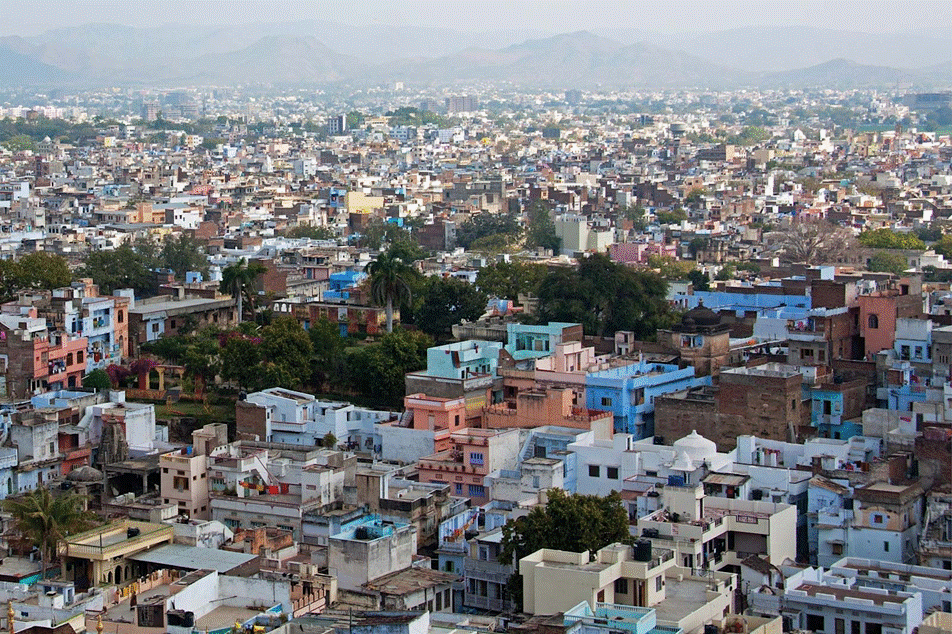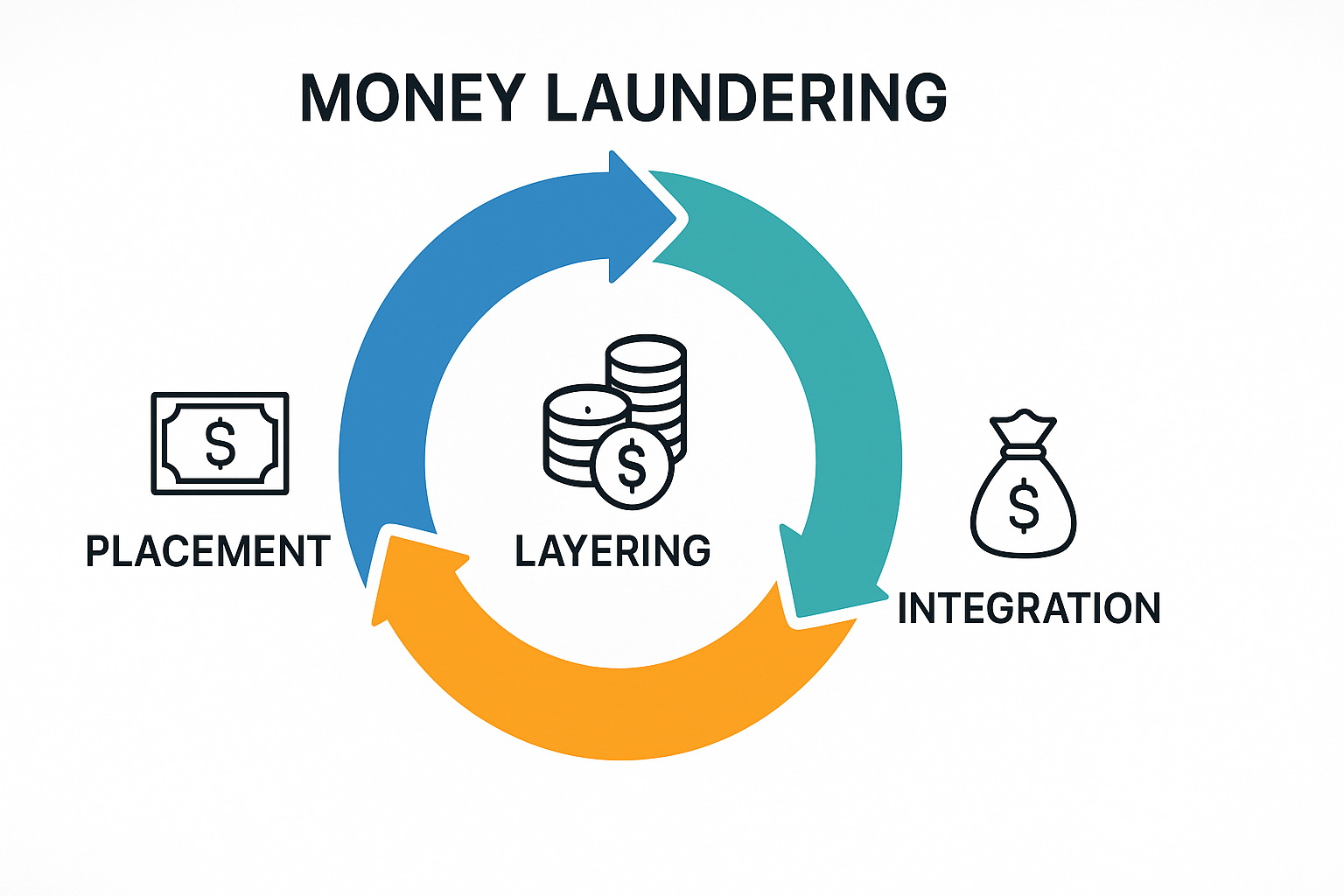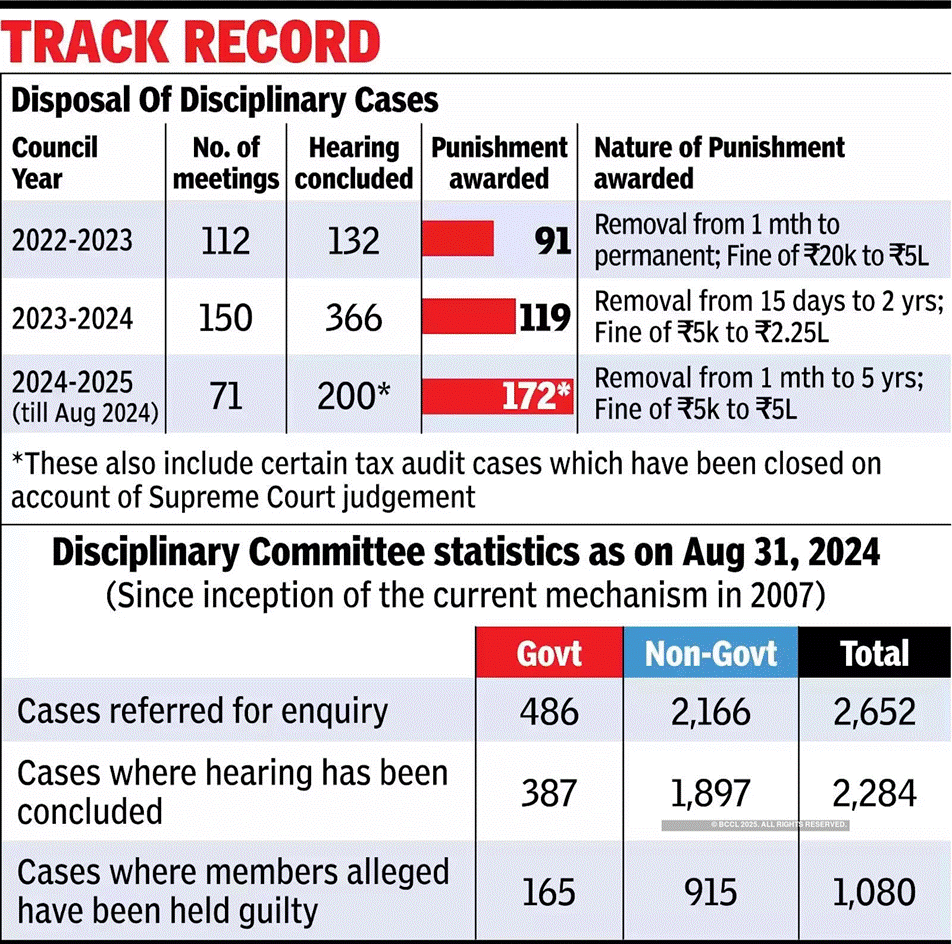How a Paper Political Party Channeled ₹271 Crore Through India’s Electoral Financing Loopholes
In August 2025, Income Tax raids across multiple states exposed a sophisticated financial scheme that undermines the very foundation of India’s democratic financing system. At the center of this investigation lies the “National Sarv Samaj Party” based in Bhilwara, Rajasthan—a registered political entity that never contested a single election yet facilitated transactions worth ₹271 crore over three years. This case illuminates critical vulnerabilities in India’s political party registration framework and reveals how legal professionals, regulatory gaps, and weak enforcement mechanisms have created a Multiverse economy that thrives in the parallel to legitimate political financing.

Aerial view of Bhilwara city in Rajasthan showing its dense urban landscape and surroundings.
The Bhilwara Paper Political Parties Money Laundering Scheme: A Masterclass in Financial Engineering
The National Sarv Samaj Party represents a paradigm case of what investigative agencies term “paper parties”—entities that exist purely on documents while serving as conduits for questionable financial transactions. Operating from Bhilwara, a textile hub in Rajasthan, this party managed to process ₹271 crore through a sophisticated network that extended across Rajasthan, Madhya Pradesh, and Uttar Pradesh. [1][2]
The modus operandi was elegantly simple yet devastatingly effective. Individuals and entities would donate substantial sums to the party through legitimate banking channels, receiving official receipts that qualified for 100% tax deductions under Section 80GGC of the Income Tax Act. The party would then return the donated amount in cash after deducting a commission ranging from 3% to 10%. This arrangement provided donors with significant tax benefits while the party retained a substantial commission for facilitating the transaction. [3][4][1]

The three stages of the money laundering process: placement, layering, and integration, illustrated in a circular flow chart.
The scheme’s sophistication lay in its exploitation of multiple legal frameworks simultaneously. While the Income Tax Act provides complete tax exemption for donations to registered political parties, it requires these parties to be registered under Section 29A of the Representation of the People Act, 1951. The National Sarv Samaj Party fulfilled this basic requirement, creating a legal façade that masked its true purpose as a financial intermediary rather than a genuine political organization. [4][5]
Legal Architecture of Electoral Financing: Gaps and Vulnerabilities
India’s political financing framework operates through a complex web of legislation designed to ensure transparency while encouraging legitimate political participation. However, this very complexity has created exploitable loopholes that sophisticated actors readily exploit. [6][7]
Registration Without Substance
The Representation of the People Act, 1951, requires political parties to register within 30 days of formation, but the criteria for registration remain remarkably permissive. Any association of Indian citizens can register as a political party by submitting basic documentation including a constitution, leadership details, and a ₹10,000 processing fee. Critically, there is no requirement to demonstrate genuine political activity or electoral intent beyond a constitutional provision stating parties must contest an election within five years of registration. [8][9]
This regulatory framework has enabled the proliferation of what the Association for Democratic Reforms terms “Registered Unrecognised Political Parties” (RUPPs). As of 2025, India has 2,764 such entities, with over 73% failing to submit mandatory financial disclosures to the Election Commission. In Gujarat alone, five unrecognised parties reported a combined income of ₹2,316 crore between 2019 and 2024 while receiving only 22,000 votes collectively. [10]
Tax Code Exploitation
The Income Tax Act’s Section 80GGC provides unlimited tax deductions for donations to registered political parties, creating a powerful incentive structure that the Bhilwara scheme exploited. Unlike corporate donations under Section 80GGB, which are limited to companies operating for more than three years, individual donations face no such restrictions. This asymmetry has enabled the creation of donation laundering schemes where individuals receive full tax benefits for amounts they never genuinely contributed. [4][5][11]
The scheme’s effectiveness was enhanced by amendments introduced through the Electoral Bonds system, which relaxed disclosure requirements and eliminated the need for political parties to report donations in their profit and loss statements. Although the Supreme Court struck down Electoral Bonds in February 2024, the regulatory infrastructure that enabled such schemes remains largely intact. [6][12][13]
Professional Enablers: The Role of Chartered Accountants and Lawyers
The Bhilwara investigation has revealed the critical role that legal and financial professionals play in facilitating political financing irregularities. The Income Tax Department’s investigation has led to disciplinary proceedings against approximately 15 chartered accountants in Ahmedabad who allegedly facilitated fraudulent donations to RUPPs. [14][15]

ICAI track record of disciplinary actions and committee statistics against chartered accountants from 2022 to August 2024, showing hearings concluded, punishments awarded, and types of penalties.
Chartered Accountants as Financial Architects
The Institute of Chartered Accountants of India (ICAI) has initiated disciplinary proceedings against chartered accountants who allegedly helped structure transactions that enabled donors to receive cash back after making ostensible political donations. These professionals provided the technical expertise necessary to navigate the complex regulatory environment while maintaining the appearance of compliance. [14]
During Income Tax investigations, several chartered accountants reportedly admitted to facilitating such transactions, though they later denied these allegations during ICAI disciplinary hearings. The cases highlight a fundamental challenge in professional regulation: while CAs are bound by codes of ethics, the intersection of political financing law and tax code creates grey areas that can be exploited by those willing to push ethical boundaries. [14]
The ICAI’s response demonstrates the importance of professional self-regulation in maintaining financial system integrity. The organization has established disciplinary mechanisms under the Chartered Accountants Act, 1949, with penalties ranging from monetary fines to suspension from practice. However, the effectiveness of these measures depends on robust investigation procedures and consistent enforcement. [14]
Legal Professionals and Regulatory Arbitrage
While the Bhilwara Paper Political Parties Money Laundering case primarily involved chartered accountants, international experience suggests that lawyers often play crucial roles in sophisticated money laundering schemes involving political entities. Legal professionals provide essential services in structuring complex transactions, creating shell entities, and navigating regulatory requirements while maintaining plausible deniability. [16][17]
The Financial Action Task Force has identified legal professionals as particularly vulnerable to unwitting involvement in money laundering due to the legitimate nature of many services they provide. In political financing contexts, lawyers may assist in party registration, constitutional drafting, and compliance procedures without necessarily understanding the ultimate purpose of these entities. [17]
Professional privilege and confidentiality rules further complicate oversight of legal services in political financing. While these protections are essential for maintaining attorney-client relationships, they can also shield questionable arrangements from regulatory scrutiny. The challenge lies in balancing legitimate professional protections with the need for transparency in political financing.
Enforcement Mechanisms and Regulatory Response
The discovery of the Bhilwara Paper Political Parties Money Laundering scheme represents both a success and failure of India’s financial enforcement apparatus. While agencies ultimately detected and acted against the irregularities, the scheme operated for three years before intervention, suggesting significant gaps in real-time monitoring and prevention systems.
Income Tax Department’s Coordinated Response
The Income Tax Department’s operation across multiple states in August 2025 demonstrates the complexity of investigating political financing irregularities. The raids covered over 200 locations and involved multiple state tax authorities, highlighting both the geographic spread of such schemes and the resources required for effective enforcement. [18]
The investigation revealed a pattern of coordination between different RUPPs, suggesting organized networks rather than isolated incidents. The department found evidence of similar schemes involving political parties in multiple states, with total irregularities exceeding ₹500 crore. This scale indicates that the Bhilwara case represents a symptom of systemic vulnerabilities rather than an isolated anomaly. [3]
Election Commission’s Gradual Awakening
The Election Commission’s response to RUPP proliferation has been reactive rather than proactive. Following the income tax investigations, the Commission has delisted hundreds of non-existent parties and implemented graded enforcement actions. However, these measures address symptoms rather than underlying structural issues that enable such schemes. [19]
The Commission’s May 2025 letter to the Department of Revenue requesting action against errant RUPPs suggests institutional recognition of the problem’s scope. However, the fact that such coordination was necessary indicates gaps in inter-agency information sharing and enforcement coordination. [19]
Systemic Implications for Electoral Transparency
The Bhilwara case illuminates fundamental tensions in India’s approach to political financing transparency. While the regulatory framework aims to encourage legitimate political participation through tax incentives, inadequate oversight mechanisms have created opportunities for systematic abuse.
Information Asymmetries and Public Accountability
The proliferation of paper parties creates significant information asymmetries that undermine democratic accountability. Voters cannot make informed choices about political representation when the true sources of party funding remain opaque. The Bhilwara scheme demonstrates how legal structures designed to protect donor privacy can be exploited to obscure illegitimate financial flows.
The scheme’s sophistication suggests institutional learning and adaptation by those seeking to exploit regulatory gaps. The use of legitimate banking channels, proper documentation, and professional services indicates a level of sophistication that challenges traditional enforcement approaches based on detecting obviously suspicious transactions.
Market Dynamics in Political Financing
The emergence of commission-based political donation schemes creates perverse market dynamics in political financing. Parties compete not on the basis of political programs or electoral appeal, but on their ability to provide tax arbitrage services to wealthy individuals and entities seeking to minimize their fiscal obligations.
This commoditization of political party status undermines the fundamental purposes of democratic institutions. When political entities exist primarily to serve financial rather than representational functions, the legitimacy of the entire political system comes under question.
Financial Regulation Challenges in a Federal System
India’s federal structure creates additional complexity in regulating political financing, as the Bhilwara case demonstrates. The scheme operated across multiple states, requiring coordination between various state and central agencies. This geographic distribution exploits jurisdictional boundaries and creates enforcement challenges.
Coordination Failures and Information Gaps
The three-year operation of the Bhilwara Paper Political Parties Money Laundering scheme before detection suggests significant gaps in inter-agency coordination and information sharing. While the Election Commission maintains records of political party registration and financial filings, this information apparently was not systematically cross-referenced with income tax data to identify potential irregularities.
The eventual detection occurred through traditional investigative methods rather than systematic data analysis, indicating that India’s financial intelligence capabilities may be insufficient for the complexity of modern financial crimes. The scheme’s detection appears to have been triggered by specific complaints rather than proactive monitoring systems.
Technological Solutions and Digital Trails
The Bhilwara investigation benefited from digital transaction records that provided clear evidence of the circular flow of funds. This suggests that technological solutions could significantly enhance detection capabilities if properly implemented and coordinated across agencies.
Real-time data sharing between the Election Commission, Income Tax Department, and financial intelligence units could enable early detection of suspicious patterns in political financing. However, implementing such systems requires significant investment in technological infrastructure and inter-agency coordination mechanisms.
International Context and Comparative Perspectives
The Bhilwara Paper Political Parties Money Laundering case reflects broader global challenges in regulating political financing while maintaining democratic openness. Many democracies struggle with similar tensions between transparency requirements and legitimate privacy interests in political participation.
Global Trends in Political Finance Regulation
International experience suggests that completely transparent political financing systems can discourage legitimate political participation while driving questionable funding underground. However, the Indian experience demonstrates that excessive opacity creates opportunities for systematic abuse that can undermine democratic legitimacy.
The Financial Action Task Force has identified political financing as a significant money laundering vulnerability, particularly in systems that provide tax benefits for political donations. The organization’s recommendations emphasize the need for robust oversight mechanisms and inter-agency coordination to prevent abuse. [7]
Lessons from Other Jurisdictions
Several countries have implemented more restrictive approaches to political financing that might address some vulnerabilities exposed by the Bhilwara Paper Political Parties Money Laundering case. Public financing of political parties, caps on individual donations, and mandatory real-time reporting requirements could reduce incentives for elaborate circumvention schemes.
However, such approaches must be balanced against constitutional protections for political participation and the practical realities of maintaining viable political organizations in large, diverse democracies. The challenge lies in designing systems that are robust enough to prevent abuse while remaining accessible to legitimate political actors.
Recommendations for Systemic Reform
The Bhilwara Paper Political Parties Money Laundering case provides clear evidence that India’s current political financing framework requires comprehensive reform to address identified vulnerabilities while maintaining democratic accessibility and participation.
Immediate Regulatory Measures
Enhanced due diligence requirements for political party registration could help prevent the creation of purely instrumental entities. Requiring demonstration of genuine political activity, such as public meetings, policy platforms, or electoral preparations, before granting registration could reduce the proliferation of paper parties.
Mandatory real-time reporting of donations above specified thresholds would enable more effective monitoring of political financing patterns. Current annual reporting requirements provide insufficient granularity for detecting suspicious activities in real-time.
Strengthened penalties for violations of political financing regulations would increase deterrent effects. Current enforcement mechanisms appear insufficient to discourage sophisticated schemes like the Bhilwara operation.
Technological Infrastructure Development
Investment in integrated data systems linking electoral, taxation, and financial intelligence databases would enable more effective pattern recognition and early detection of irregularities. Such systems could automatically flag unusual donation patterns or inconsistencies between reported political activity and financial flows.
Blockchain-based transparency systems could provide real-time public access to political financing information while maintaining appropriate privacy protections. Such systems could enable public scrutiny while preventing manipulation of financial records.
Professional Accountability Enhancement
Strengthened oversight of legal and financial professionals involved in political financing could help prevent future schemes. This might include mandatory reporting requirements for professionals facilitating large political donations or enhanced penalties for involvement in fraudulent schemes.
Professional education and training programs focused on political financing regulations could help ensure that practitioners understand their obligations and the ethical implications of their activities.
Conclusion: Strengthening Democratic Financial Integrity
The National Sarv Samaj Party case represents more than an isolated incident of financial irregularity—it exposes fundamental weaknesses in India’s approach to regulating political financing that threaten the integrity of democratic institutions. The scheme’s sophistication and duration demonstrate that current regulatory frameworks are inadequate for addressing modern financial engineering techniques applied to political entities.
The case highlights the critical importance of professional accountability in maintaining financial system integrity. When chartered accountants, lawyers, and other professionals facilitate schemes that undermine democratic transparency, they damage not only their own professions but the broader institutional framework that supports democratic governance.
Moving forward, India must balance competing objectives of encouraging legitimate political participation while preventing abuse of democratic institutions for personal financial gain. This requires not only regulatory reform but also cultural change within professional communities that recognize their roles as guardians of democratic integrity.
The Bhilwara investigation provides a valuable opportunity to strengthen India’s democratic institutions through comprehensive reform of political financing regulation. However, such reform will require sustained political will, significant investment in enforcement capabilities, and recognition that democratic transparency is essential for maintaining public trust in political institutions.
The stakes extend beyond technical questions of financial regulation to the fundamental legitimacy of democratic governance in India. When political entities can be created and operated primarily for financial advantage rather than democratic representation, the entire foundation of representative government comes under question. The Bhilwara case thus serves as both a warning and an opportunity—a chance to strengthen democratic institutions before their credibility is irreparably damaged by systematic abuse.
Only through comprehensive reform that addresses both immediate vulnerabilities and underlying structural weaknesses can India ensure that its political financing system serves democratic rather than purely financial purposes. The National Sarv Samaj Party may never have contested an election, but its legacy could help strengthen electoral integrity for generations to come.
- https://rajasthan.ndtv.in/rajasthan-news/raid-on-national-sarva-samaj-party-national-president-in-bhilwara-party-formed-for-political-donations-transaction-of-rs-271-crore-in-3-years-9078029
- https://www.myneta.info/LokSabha2024/candidate.php?candidate_id=2748
- https://www.youtube.com/watch?v=h-oLWQWkXQ4
- https://www.instagram.com/p/DNbPE-JTaf3/
- https://www.barodabnpparibasmf.in/assets/download_documents/KIM_-_Baroda_BNP_Paribas_Gilt_Fund_72.pdf
- https://timesofindia.indiatimes.com/city/jaipur/ed-conducts-raids-at-several-locations-in-raj/articleshow/119271301.cms
- https://www.myneta.info/LokSabha2024/candidate.php?candidate_id=2743
- https://subkuz.com/news/english/details/ed-uncovers-2700-crore-money-laundering-scheme-rajasthan/76058
- https://election.rajasthan.gov.in/Expenditure of Political Party/Sashakt Bharat Party 20-21.pdf
- https://rajasthan.ndtv.in/videos/it-raid-in-rajasthan-fake-political-donations-worth-rs-300-crore-exposed-political-parties-bhilwara-968220
- https://www.youtube.com/watch?v=eJ4lo-eMLGQ
- https://www.caalley.com/news-updates/indian-news/income-tax-raids-across-200-locations-over-fake-political-donation-claims
- https://www.bajajfinserv.in/investments/section-80ggb-of-income-tax-act
- https://adrindia.org/sites/default/files/guidelinesandformat_under_Section_29A.pdf
- https://cleartax.in/s/section-80ggc-of-income-tax-act
- https://ceojk.nic.in/PoliticalParties.htm
- https://indianexpress.com/article/political-pulse/bsp-akash-anand-interview-lok-sabha-elections-mayawati-9287453/
- https://tax2win.in/guide/section-80ggc
- https://mahasec.maharashtra.gov.in/Site/141816/Registration-of-Political-Parties
- https://ceodelhi.gov.in/PDFFolders/Show_Cause_Notices_to_Registered_Unrecognized_Political_Parties12Aug2025.pdf
- https://cleartax.in/s/income-tax-exemptions-political-parties
- https://www.aljazeera.com/news/2024/2/15/what-are-electoral-bonds-the-secret-donations-powering-modis-bjp
- https://www.ijcrt.org/papers/IJCRT2502417.pdf
- https://en.wikipedia.org/wiki/Enforcement_Directorate
- https://economictimes.com/news/politics-and-nation/electoral-bonds-hafta-vasooli-shell-companies-kickbacks-congress-claims-poll-bond-details-open-a-can-of-worms/articleshow/108509764.cms
- https://ijirl.com/wp-content/uploads/2025/01/FUNDING-THE-DEMOCRATIC-PROCESS-ANALYZING-THE-ELECTORAL-BONDS-OF-INDIA.pdf
- https://www.newindianexpress.com/cities/delhi/2025/Aug/26/ed-raids-aaps-saurabh-bharadwaj-in-hospital-construction-case-party-claims-attempt-to-divert-from-modis-degree
- https://www.reporters-collective.in/trc/electoral-bonds-the-art-of-extracting-wealth-from-loss-making-firms
- https://vajiramandravi.com/upsc-exam/electoral-funding/
- https://www.taxtmi.com/news?id=51652
- https://fatfplatform.org/assets/Indias-Electoral-Bond-Scheme-poses-Money-Laundering-Risks.pdf
- https://www.drishtiias.com/daily-news-editorials/india-s-election-funding-system
- https://www.taxtmi.com/news?id=53564
- https://www.stimson.org/2024/indias-electoral-bond-conundrum/
- https://enforcementdirectorate.gov.in/press-release?page=3
- https://timesofindia.indiatimes.com/india/political-party-accounts-must-be-subjected-to-cag-scrutiny/articleshow/46751236.cms
- https://www.niceactimize.com/blog/are-lawyers-facilitating-money-laundering-534/
- https://adrindia.org/contenr/adr-report-on-registered-unrecognised-political-parties-in-india-in-english
- https://www.caalley.com/news-updates/indian-news/15-cas-under-icai-lens-for-facilitating-bogus-donations-to-rupps
- https://www.bureauft.nl/media/btvjsaxr/money-laundering-and-terrorist-financing-vulnerabilities-of-legal-professionals.pdf
- https://legalaffairs.gov.in/sites/default/files/chapter 4.pdf
- https://finance.yahoo.com/news/icai-probes-15-cas-over-121033887.html
- https://scholarship.law.nd.edu/cgi/viewcontent.cgi?article=1160&context=jleg
- https://www.vakilkaro.com/blogs/political-party-registration-process
- https://timesofindia.indiatimes.com/india/i-t-cracks-down-on-unrecognised-political-parties/articleshow/94060714.cms
- https://www.signicat.com/blog/why-are-lawyers-at-risk-of-being-used-for-money-laundering
- https://www.linkedin.com/pulse/unveiling-tax-veil-taxation-political-souff
- https://lawcouncil.au/media/media-releases/legal-profession-proactively-mitigating-money-laundering-risks
- https://economictimes.com/wealth/tax/used-donation-to-a-political-party-for-income-tax-deduction-it-dept-is-sending-warning-sms-if-it-was-a-mistake-file-itr-u-by-march-31-2025/articleshow/117679803.cms
- https://kb.icai.org/pdfs/PDFFile6659b535b2b082.84693291.pdf

















